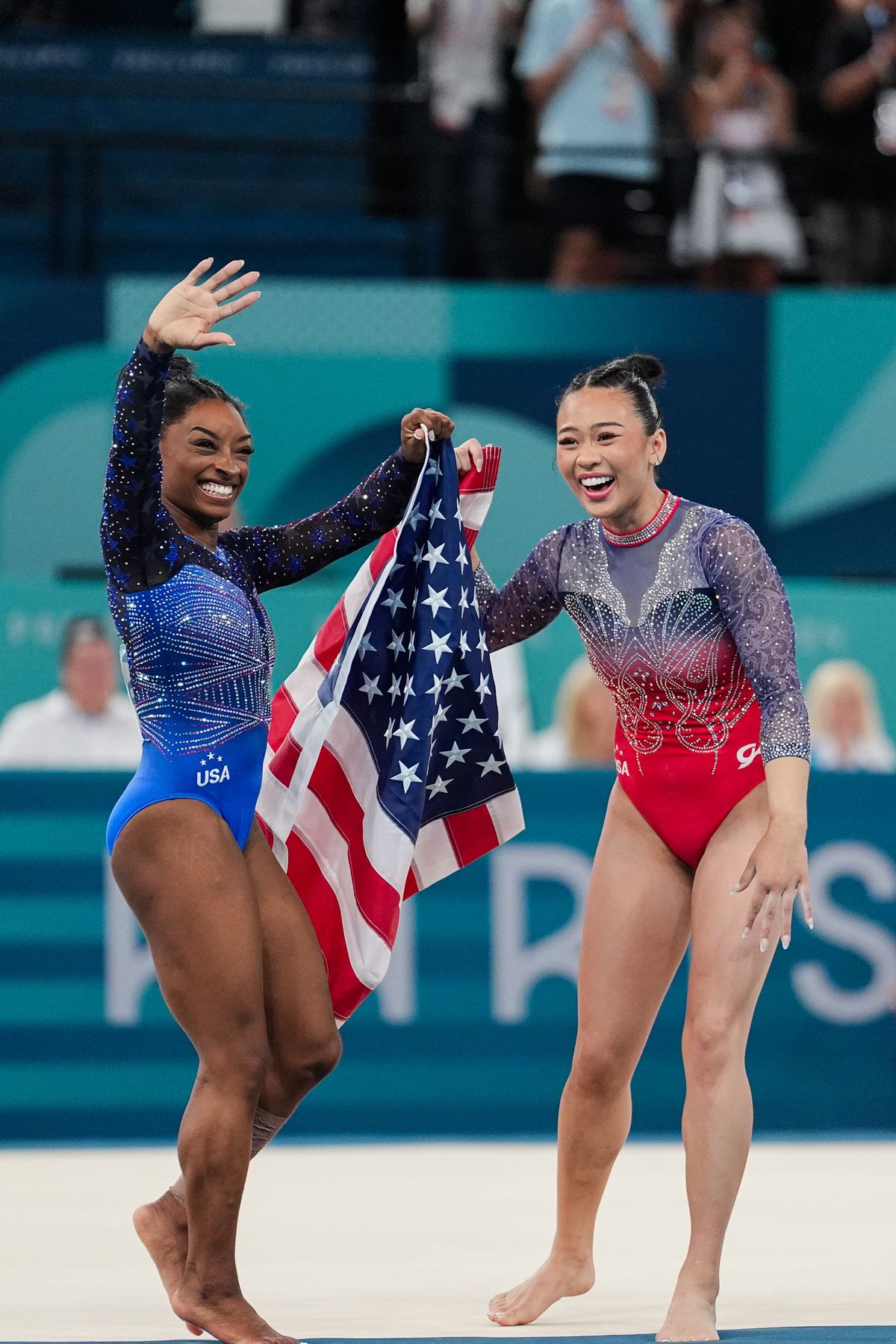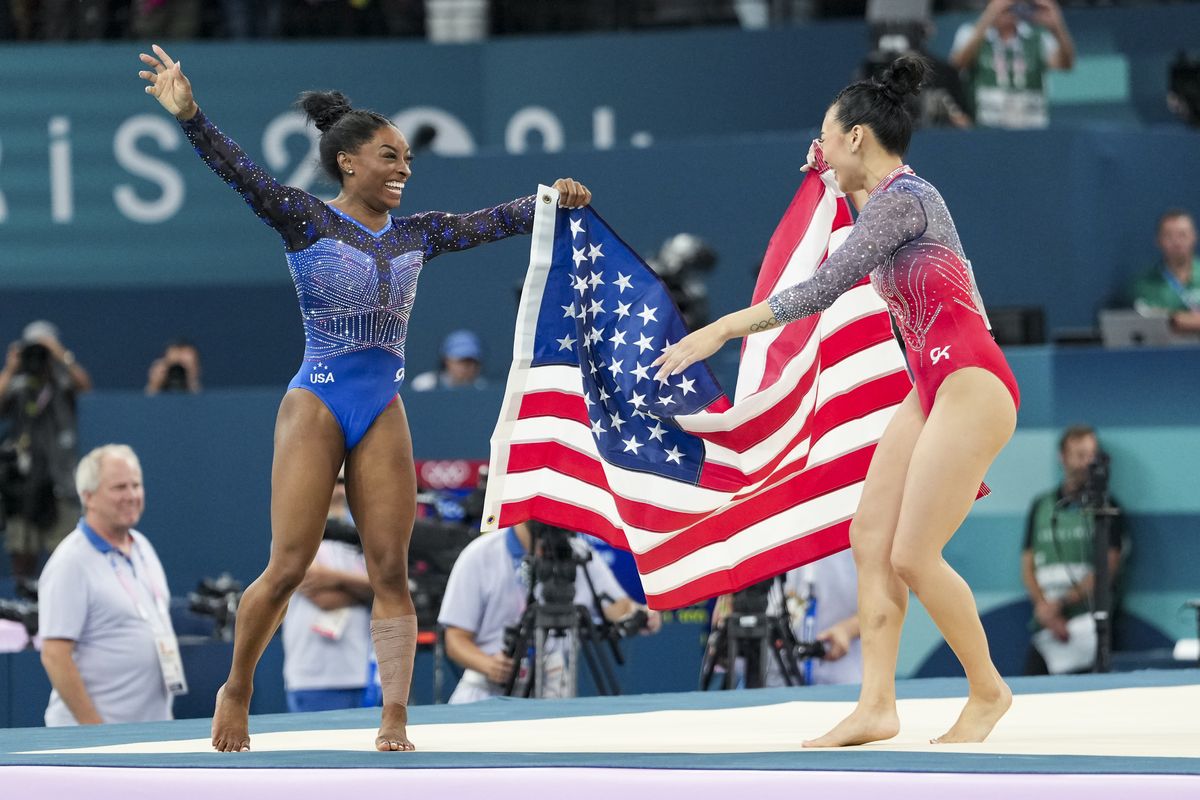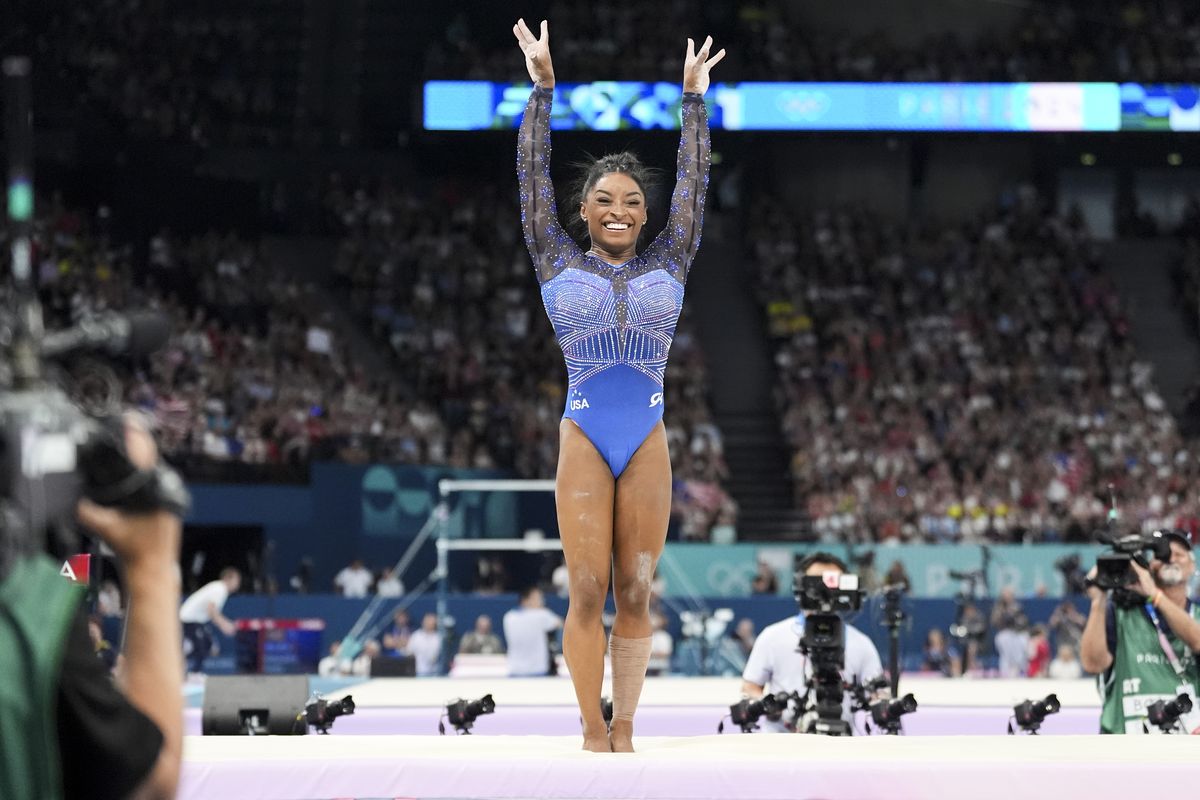Simone Biles soars to second Olympic all-around gold medal; Suni Lee wins bronze with triumphant floor routine
Team USA’s Simone Biles, left, and Sunisa Lee celebrate after the artistic gymnastics women’s all-around final Thursday at Bercy Arena in Paris. Biles won gold and Lee bronze. (New York Times)
PARIS – As Brazilian fans shook their flags and chanted as if they were at a soccer game, chests puffing as the name of their star gymnast, Rebecca Andrade, flashed atop the all-around standing, the public address announcer asked, “Are you enjoying it, Paris?”
Simone Biles decidedly was not. She looked, in fact, like she could spit nails.
A disastrous uneven bars routine – or at least disastrous by her impeccable standards – slotted Biles in an unfamiliar position after two rotations in the Olympic all-around competition: the one in which she’s not ahead. Trailing Andrade and Algeria’s Kaylia Nemour, Biles got in line to lead her group to its next rotation, the balance beam. Not exactly the place to go and chill.
Biles admits that she spent her time waiting, “praying to every single god out there,” and that “she had never been so stressed in her life.”
And yet there was Biles, flipping and flying on an apparatus that is no wider than an iPhone, that takes confident women and shakes them to the core, and redefines the concept of slimmest of margins on the regular. For the better part of her career, Biles has left fans dizzy, pushing the boundaries of a sport already incredibly dangerous. She has won every all-around competition she’s entered since 2013, a string of 37 in a row, and created five signature moves that until this week, when Panama’s Hillary Heron landed the Biles I on floor, no one else in the world dare tried in Olympic competition.
Her single greatest moment, however, might have been that beam routine. Facing inordinate pressure in a building teeming with unexpected tension, nursing a calf injury that still required tape, and on the heels of an Olympic Games in which she withdrew due to struggles with mental health, Biles had just the smallest of balance checks, landing her dismount with a short hop. Her 14.566 moved her back in front of Andrade, with only the floor exercise to go. Which is for Biles, a walkover.
There, Biles brought the house down, incorporating the skills she created, to assure herself a gold. After she finished, a huge smile spread across her face, Biles popped down the stairs off the floor and went directly to the mats circling the uneven bars. She leaned on her elbows, clearly overcome, and later mouthed to her coach, Cecile Landi, “Oh, my god, I can’t believe it.”
“Team competition is always my favorite, because we all get out there and compete together,’’ Biles said. “But for me personally, tonight, this means the world to me. I knew if I did my work I’d be fine.”
Tokyo Olympic all-around champion Sunisa Lee capped her day with the best floor routine of her Paris Games to take bronze.
If this was Biles’ final all-around – she has played coy with such questions but she is 27, so it is hardly out of the question – it was a perfect way to go out, one night encapsulating all that Biles was, all that she’s been through and all that she’s become. No one has questioned her physical strength and daring. She is a gravity-defying daredevil packed into 57 inches of fearlessness, the most dominant athlete pound for pound in sports.
But her search for mental sanctuary has not been easy. Her withdrawal from the 2020 Game in Tokyo opened the floodgates of introspection, forcing Biles to reconcile not just the “twisties” that pulled her out of competition, but the root of what caused them. She emerged a happier and stronger athlete, one determined to remind herself that she started gymnastics because she loved it.
It is fitting that beam put the coda on her all-around career. It was the beam that helped restore Biles in Tokyo. She withdrew from the team final, the all-around and every event final that she qualified for save the beam. She won a bronze in that event, saying at the time it was the best medal she’d earned.
It delivered for her again, albeit in completely different circumstances. Biles is not accustomed to fighting her way to victory. Ordinarily to face Biles in an all-around is to try to beat Rocky Marciano at any point of his career, or Edwin Moses in his hurdling heyday. Like thinking you have a shot when Katie Ledecky jumps in the pool in the 800 meters, or trying to convince yourself you could have beat Michael Phelps in the 200IM. It’s Oscar night when “Ben-Hur” was nominated, or the Grammy Awards after Michael Jackson released “Thriller.”
It is to absolutely know that you have no shot. Start polishing the silver because you won’t touch gold. Your best will always be second best. Enjoy the participation trophy because you are simply not winning.
Her last loss came in Chemnitz, Germany, on March 30, 2013. Just 16, she’d only just begun her senior gymnastics career. She still had braces; didn’t have a license. Three meets into her career in a tri-meet that would otherwise not register anywhere on the gymnastics radar save for what happened there; and what has happened since. Kyla Ross, a woman a little less than a year removed from a silver medal in the Olympics, won the all-around. Biles took second, finishing behind Ross by 1.3 points.
Biles never lost again. If she entered an all-around, it was over. Seventeen women have finished second to her, only four of them – Ross (at worlds in 2013) Russia’s Aliya Mustafina (at 2014 2orlds), Lee (at 2019 worlds) and Shilese Jones (at the 2023 World Team Selection Camp) have managed to get within less than a point of her.
Yet for two rotations, Andrade thought she might do the impossible. She has been the toughest foil for Biles of late. Having faced down her own struggles – she tore her ACL three times – Andrade has, at 25, emerged a better gymnast for it, not unlike Biles. She finished as runner-up to Biles at world championships a year ago, by a slim by Biles’ standards 1.633. Her routines pack hefty difficulty, and she executes them beautifully.
It was because of Andrade that Biles opted to do her more difficult vault – a Yurchenko double pike, guessing that she might needed the added difficulty to secure the title.
“ OK, I think I have to bring out the big guns today,” Biles said of her planning. “I’ve never had an athlete that close before, so that definitely put me on my toes and it brought out the best of me as an athlete.”
Though she and Lee joked that they were trying to do mental math – Lee did not secure a medal until the final rotation, either – she did the proper calculations here. Her 15.766 on the vault factored largely.
Because Andrade did not, in fact, lose the meet. She hit all four of her routines.
Biles simply went out and won it.






